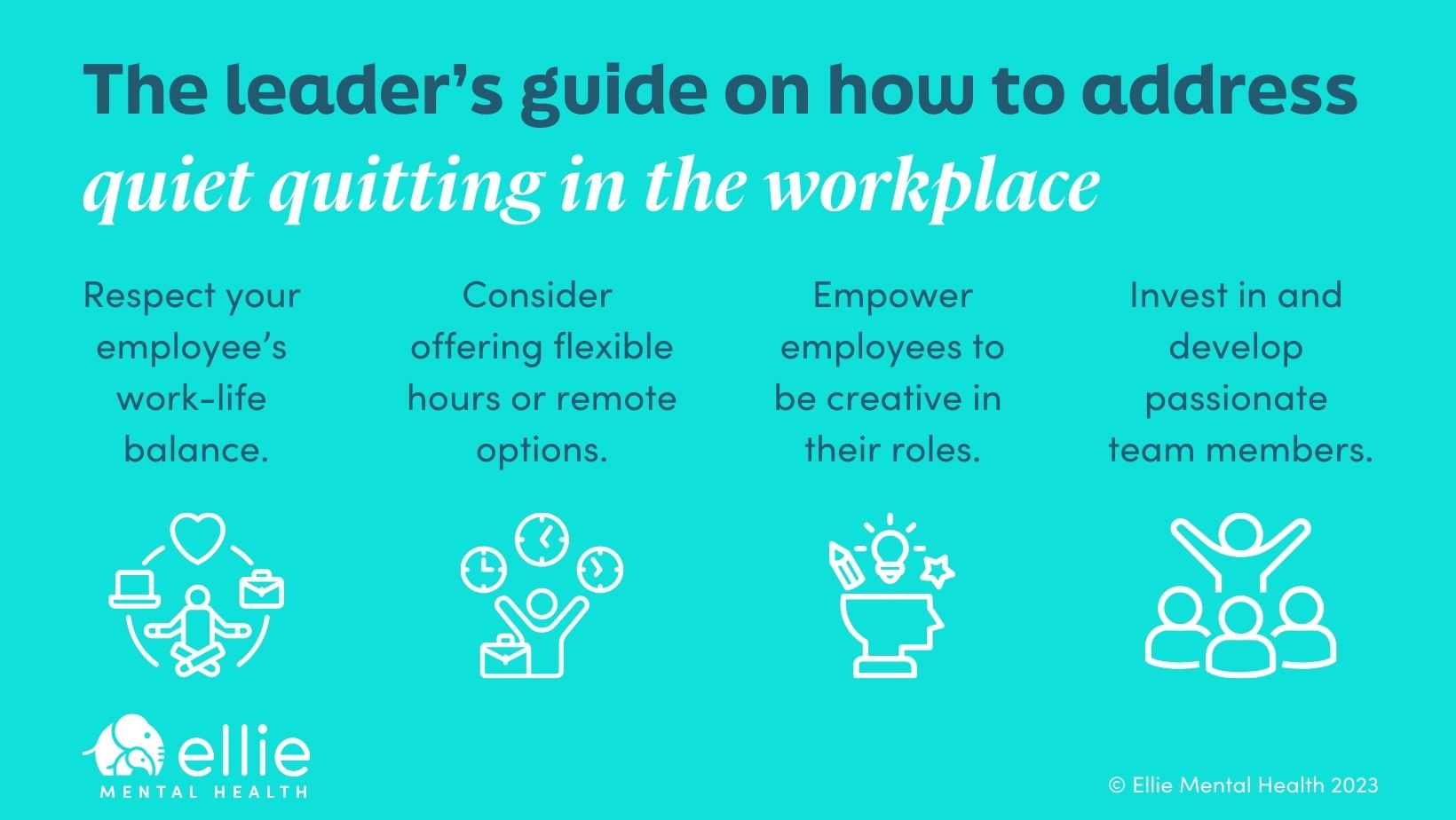Quiet quitting has been a major buzzword in the last few months. As many have experienced anxiety, depression, extreme work stress, and burnout in the years following the pandemic, quiet quitting – or only giving the bare minimum at work – has become a topic of much debate.
On one end of the spectrum, some would claim that quiet quitting is the key to achieving the “elusive” work-life balance. Many people have experienced toxic workplaces and supervisors who expect their employees to sacrifice everything for their work. Excessive overtime, taking advantage of salary workers, requiring staff to work on holidays, not allowing paid vacations, and providing little to no benefits – these trends in the modern workplace have damaged employee morale and left people feeling chronically stressed, exhausted, and powerless. In these unhealthy work environments, people struggle to balance their mental health, self-worth, and familial obligations with their desire to perform well at work, pursue a career, and continue to pay the bills in a troubling economy.
For individuals who are burnt out and feel they have been mistreated, quiet quitting is an attractive solution to put food on the table and keep their current job without living under a cloud of chronic, debilitating stress. However, what many people don’t realize is that in the process of quiet quitting, they are still sacrificing their own needs and mental health in the process. They are choosing to continue working in an environment where they feel their only option is to simply get by. And in the process, they sacrifice their passion, their drive, their ambition, their creativity, and their sense of purpose – all of which could be better fostered and ignited in a healthier workplace.
How To Respond to Quiet Quitting in the Workplace

As a leader, supervisor, or business owner, you may have experienced quiet quitting in the workplace, and you might feel conflicted about how to respond. Should you turn a blind eye? Should you call out the employee, reprimand them, or even consider cutting ties? We encourage you to first react in a supportive manner, rather than a disciplinary one.
If someone feels they don’t want to give anything more to their employer, then there is a good chance something is missing in the culture of that organization. Many people have had extreme reactions to quiet quitting in the workplace, assuming that it is an act of laziness or self-entitlement. However, we ask that you look deeper into why quiet quitting happens and reflect on your company’s values, managerial styles, expectations, and treatment of your employees. Rather than looking for solutions on how to deal with an employee who is quiet quitting, you should instead consider how you can create a work environment that ignites passion in your team.
1. Create Balance
No one should feel like they need to work 60 hours a week or that they need to sacrifice their values, relationships, or sanity to keep a job. As a leader, you should be attentive to your employees’ boundaries. Everyone needs a good work-life balance. Listen to the concerns of your employees, understand that they need time to rest and recharge, and make it clear that you value their obligations and aspirations outside of work.
2. Offer Flexibility
Many employees who quiet quit are likely struggling to balance many important aspects of their life. They may feel that if they give too much of their passion to their career that they will be unable to give the same level of energy and attention to their significant other, kids, or friends. They may have a side job or other major aspirations outside of work they’ve longed to pursue. Or they may simply need more time and space to decompress, exercise, and improve their physical and mental health.
Flexibility gives your employees more choice in how they structure their life. This might look like letting your employees choose when they start in the morning, so they don’t need to stress about taking their kids to school or hitting the gym before work. If possible, you can consider a hybrid work environment – allowing your employees to choose if they’d like to work in the office, at home, or a combination of the two. By giving people the freedom to have a work situation that allows them to comfortably accommodate their personal needs, they will feel more empowered to give their best during the hours they are working.
3. Encourage Creativity
Creativity and passion go hand in hand. Your employees should feel empowered to bring their ideas forward — not because they feel pressured to but because they are genuinely invested in the work they do. Make an effort to let every member of your team know that their voice matters. This a great way to grow and inspire people in junior-level positions, and you might be surprised by the ideas and solutions they bring forth.
4. Seek Growth
When employees display their passion, creativity, and ambition to give more than the bare minimum in their work, they should be given opportunities to continue growing in their careers. Your employees are your biggest investment. You don’t want to just be a stepping stone that launches your employees into a new, better-paying career. By providing people with plenty of growth opportunities and being attentive to the unique strengths and potential each individual brings, you build the longevity and loyalty of your team.
Employee Mental Health Matters
Mental health can impact someone’s motivation, their creativity, and their work satisfaction. Even if you don’t overwork your employees and strive to treat them with the respect they deserve, if an employee has poor mental health, they may be more prone to burnout and see quiet quitting as a way out.
As an employer, it’s vital that you are aware of the impact of poor mental health in the workplace and that you create a work culture that openly destigmatizes and provides support for mental health issues. Failing to be proactive in this area can have many serious consequences for your employees and your business:
- You are likely to experience higher rates of absenteeism, shirking, and poor productivity
- A poor work environment or unaddressed mental health issues can increase turnover
- Prospective employees may turn away a job offer if they require mental health support
- Employees may be more likely to abuse substances, be suicidal, or display risky behavior
- Your employees may feel burnout, unmotivated, and unsure of how to move forward
- Poor mental health may lead to more conflict, bullying, discrimination, and workplace violence
Alternatively, if you have a vested interest in your employees’ mental health, their productivity will grow. And they’re more likely to stick with your company in the long run. While you may outwardly say you care about your employee’s mental health, we ask you to take a moment to take an introspective look at what resources and support you are providing to your employees.
If someone feels overwhelmed, have you created a work environment that encourages them to come forward and look for a solution? Or are they more likely to become burnt out – opening the door for quiet quitting or their actual resignation? Are there solutions and valuable resources in place when employees need time to refresh or take care of a serious mental health issue?
Of course, you can’t outright ask your employees about their mental health history. However, there are several ways you can provide a safe outlet for your employees to seek support for their mental health:
- Start the conversation: Don’t leave it up to your employees to be the first ones to bring up mental health. By openly talking about mental health in the workplace, you’ve made a major step in helping others feel comfortable when they’re struggling. This can be something as simple as acknowledging that mental health issues, burnout, and chronic workplace stress are serious while encouraging your employees to communicate if they need support. This could also mean highlighting employee assistance programs (EAPs) and making sure that employees know how to utilize these programs.
- Offer multiple options for disclosure: While you might be comfortable handling your employee’s mental health concerns, it’s very possible they might not feel comfortable disclosing them to you. It helps to have several leadership members, an HR individual, or an anonymous source people can go to when they need to talk.
- Minimize work stress and overload: Creating a less stressful work environment can go a long way in helping your employees feel passionate and engaged in their work. When an employee goes above and beyond, don’t “punish” them by adding more and more onto their plate. Instead, be realistic about what you expect from each individual in a workday. Rather than wait to see if they’ll crash and burn, provide them support before they reach their limit. People thrive and are able to exercise creativity in their roles when have the space to do so.
- Be attentive to conflict and harassment: If an employee is being harassed or bullied at work, they may not always be comfortable coming forward, or they may wonder if they’re just overexaggerating the situation. Educate your employees on what workplace harassment can look like, and make it clear that you do not tolerate that type of behavior. If an employee feels distressed or threatened, take their concerns seriously and quickly address the issue.
- Educate yourself and your staff: Do you know the signs of burnout? Do you understand the impact of imposter syndrome? Are you aware of the effect discrimination can have on employees? Do you know what to do in a mental health crisis? Invest in mental health training for you, your HR team, managers, and other leadership members so you can better identify when someone might be struggling and know the most effective way to respond.
- Consider providing better benefits: If an employee has a mental health issue, do they have the resources to see a therapist and get care? Poor health benefits can lead to more expenses and poorer outcomes for your employees in the long run. Apart from good health coverage, there are many types of mental health benefits you can look into to provide further support, including phone apps, access to remote mental health therapists through employee assistance programs, and support groups.
Navigating the Road Ahead
Striking the perfect balance between meeting your productivity goals and ensuring employee satisfaction can be an ongoing challenge for business owners. On one hand, you need to ensure you remain profitable to keep your business afloat. If you’re like many other business owners that have struggled financially following the pandemic, you may believe that you don’t have the time or resources to create the kind of work environment we’ve described here.
However, without addressing the root cause of quiet quitting, your business will only struggle more in the long run. High turnover rates, poor employee productivity, and unaddressed mental health issues are a recipe for tanking your profits and being in a constant state of reactivity.
Quiet quitting has been a painful topic for many business owners. And as anxiety, depression, and burnout have risen following the pandemic, you may feel like employee dissatisfaction is outside the realm of your control. However, there is still much you can do – even if they’re small steps — to improve morale, support your employees, and make changes to your company culture that will benefit your business in the long run.
Ellie Mental Health is passionate about inspiring current and future generations of professionals in the mental health field. Discover your next career as a therapist or ops member at Ellie.


